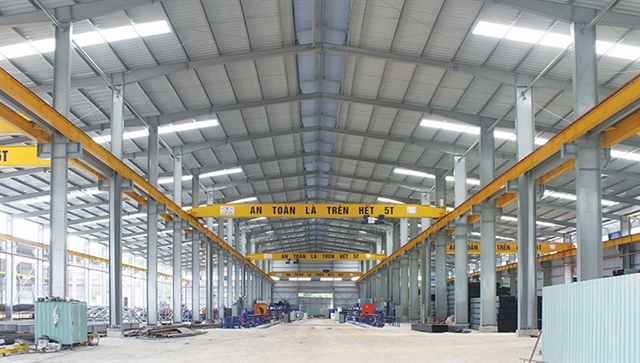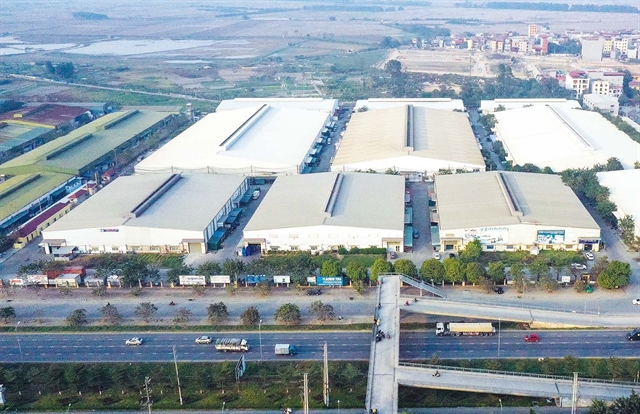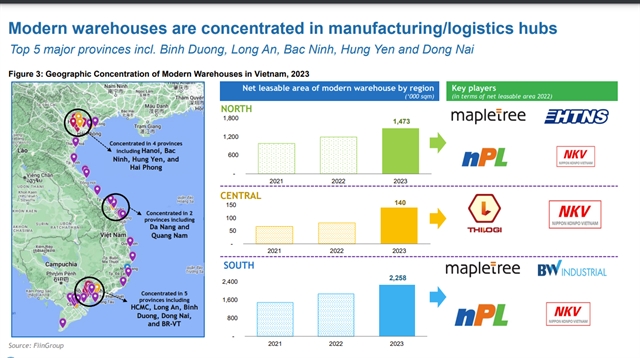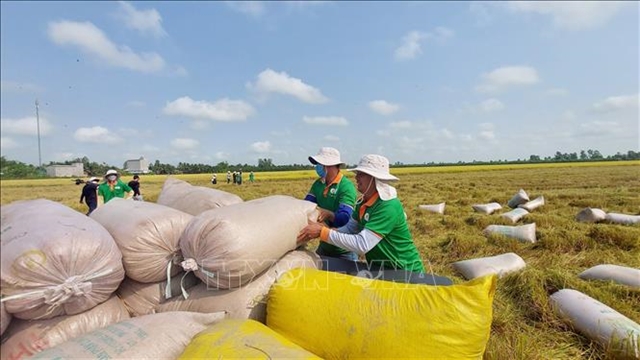 Economy
Economy

 |
| Warehouses in Việt Nam. — Photo courtesy of VIR |
HÀ NỘI — Foreign developers have dominated the modern warehouse market in Việt Nam, accounting for over 75 per cent of the country’s market share by the end of 2023.
Despite the global economic downturn, Việt Nam's warehousing sector continues to expand. This growth is driven by increasing demand for cold storage, especially from the seafood and fresh food processing industry, which accounts for 70-80 per cent of the cold storage demand in Việt Nam.
According to a new report from FiinGroup Vietnam titled 'Vietnam Logistics: Aggressive expansion of Foreign Investors,' warehousing remains the most attractive logistics segment in Việt Nam thanks to strong commercial, manufacturing and retail activities, including modern trade and food services.
By the end of 2023, Việt Nam's modern logistics industry was using nearly 3.9 million square metres of floor space. The annual growth rate from 2020 to 2023 was 23 per cent and is expected to remain high in the next few years. Warehousing remains the most important field in Việt Nam's promising logistics segment, attracting both local and foreign investors.
The report noted that in recent years, Việt Nam’s modern warehousing market has recorded active participation of both domestic and foreign investors, with the development of large-scale logistics. The country’s top five players include Mapletree, SLP, JD Property, Gemadept and Transimex.
However, foreign investors are dominating the modern warehouse market in Việt Nam, accounting for over 75 per cent of the market share of warehouse and factory floor space for rent by 2023.
The top three foreign-invested players alone, including Mapletree, BW Industrial and SLP, account for 46 per cent of the total modern warehouse rental area of the market.
Currently, domestic enterprises account for more than 25 per cent of the market share. The top three local leading players, namely ICD ST, NPL Logistics and Gemadept, account for 10.6 per cent of the total modern warehouse rental area.
 |
| Modern logistics are concentrated in production/logistics centres in the top five major provinces, including Bình Dương, Long An, Bắc Ninh, Hưng Yên and Đồng Nai. — Photo courtesy of FiinGroup |
According to FiinGroup, there are about 25 warehouse projects that will be developed from now through 2027, with a total additional area of 1.87 trillion square metres. The annual growth rate of the modern logistics area is forecast to remain at 7 per cent during this period.
BW Industrial will deploy a large project in Đồng Nai Province in 2026, with an estimated effective floor area of 243,000 square metres. Mapletree will also deploy a project in Bắc Ninh Province in 2025, with an estimated effective area of 198,000 square metres.
Modern logistics are concentrated in production/logistics centres in the top five major provinces, including Bình Dương, Long An, Bắc Ninh, Hưng Yên and Đồng Nai.
Currently, both domestic and foreign investors are pouring strong investments into logistics development. Mapletree is actively expanding its warehouse portfolio in Việt Nam with major logistics centres in Bắc Ninh, Hưng Yên and Bình Dương provinces. Each centre has 12-24 warehouses. Two 'rising stars' in Việt Nam's modern warehouse market, BW Industrial and NPL Logistics, are holding 22 new warehouses in both northern and southern Việt Nam.
Infrastructure development, along with the increase in modern warehouses in Việt Nam, is encouraging the growing demand for giant manufacturers and modern retail chains globally. This demand is supported by the positive development of e-commerce trends and global supply chain restructuring.
Localities are planning to expand industrial park land to attract investment, including in Long An, Đồng Nai and Bắc Giang provinces.
Strong growth in global e-commerce is further driving increased demand for storage systems that seamlessly integrate existing functions, with key logistics components. Key focus areas will include expanding cold storage capacity, enhancing technological infrastructure and ensuring compliance with international standards. — VNS




